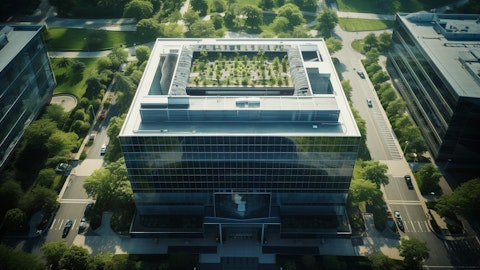Quanterix Corporation (NASDAQ:QTRX) Q2 2025 Earnings Call Transcript August 9, 2025
Operator: Good day, everyone, and thank you for standing by. My name is [ RJ ], and I will be your conference operator today. At this time, I would like to welcome everyone to the Quanterix Corporation Q2 2025 Earnings Call. [Operator Instructions] I would now like to turn the call over to Josh Young, Head of Investor Relations. Please go ahead.
Joshua Young: Thank you, and good afternoon. With me on today’s call are Masoud Toloue, Quanterix President and CEO; and Vandana Sriram, Quanterix Chief Financial Officer. Today’s call is being recorded, and a replay of the call will be available on the Investors section of our website. During the course of today’s presentation, we will make forward-looking statements within the meaning of the U.S. Private Securities Litigation Reform Act. These forward-looking statements are based on management’s beliefs and assumptions as of today, August 7th, 2025. We may not actually achieve the plans, intentions or expectations disclosed in our forward-looking statements. Forward-looking statements involve known and unknown risks, uncertainties, assumptions and other factors that may cause our actual results performance or achievements to be materially different from any future results, performance or achievements expressed or implied by the forward-looking statements.
To supplement our financial statements presented on a GAAP basis, we have provided certain non-GAAP financial measures. These non-GAAP financial measures are used to evaluate our operating performance in a manner that allows for meaningful period-to-period comparison and analysis of trends in our business and our competitors. We believe that such measures are important in comparing current results with other periods results and assessing our operating performance within our industry. Non-GAAP financial information presented herein should be considered in conjunction with and not as a substitute for the financial information presented in accordance with GAAP. Investors are encouraged to review the reconciliations of these non-GAAP measures to their most directly comparable GAAP financial measures set forth in the presentation posted to our website and in the earnings release we issued today.
Finally, any percentage changes we will discuss will be on a year-over-year basis unless otherwise noted. Now I’d like to turn the call over to Masoud Toloue. Masoud?
Masoud Toloue: Thank you, Joshua. I’d like to thank the entire Quanterix team for their dedication to our mission. We made significant progress during the quarter and have positioned the company for long-term growth and value creation. Highlights since our last call include completing the transformative Akoya acquisition, investing in strategic drivers to support sustainable double-digit revenue growth and margin improvement, generating $24 million of revenue in a difficult market environment. This was below our expectation due to temporary headwinds in academic funding and biopharma spending. I will discuss specific actions we are taking, managing our cash diligently to preserve continued financial flexibility and taking decisive action to help ensure we are cash flow positive in 2026.
It has been just 1 month since we completed the Akoya acquisition, and we’re thrilled with both the long-term growth potential of Akoya’s exciting Spatial technology and the quality of the talented team. The combined Quanterix and Akoya management teams took a clean sheet of paper look at how to build an organizational structure for the future that allowed us to be lean and nimble, but with the resources available for investments needed to sustain and grow our business. The conclusion is a structure that ensures a breakeven position in 2026, a double-digit growth trajectory for the coming years in our core markets and the additional opportunity to pursue significant upside potential in diagnostics. We expect to achieve approximately $85 million in synergy savings and cost reductions within this time frame.
As of today, we’ve already implemented 75% of these expense reductions on a run rate basis. We’ve outlined a road map in the slides, which we’ll review quarterly that shows synergies realized per quarter along with our path to cash flow positivity in 2026. The life science tools market and Quanterix’s position with it remain highly attractive in the long term, with proteomics offering one of the most transformative opportunities in our sector today. Proteomics is increasing in importance, and we believe it is poised to reshape how we understand, diagnose and treat disease. Proteomics is where genomics was 2 decades ago. And just as advancements in genomics unlocked a wave of high-throughput discovery that led to the rise of specialized diagnostic labs and precision therapies, proteomics is now beginning to reveal novel clinically relevant biomarkers.
At the center of this shift is Quanterix with the most sensitive protein detection platform commercially available. This unparalleled sensitivity enables our platform to detect low abundance biomarkers that are often invisible to other technologies, particularly in complex diseases like neurodegeneration and cancer. What sets Quanterix apart is our unique ability to translate these discoveries into actionable assays for clinical trials and diagnostic testing through our Simoa and now Spatial platforms. This convergence between groundbreaking proteomic discovery and real-world clinical utility creates a powerful value opportunity, positioning us to lead the next wave of innovation in advanced disease detection and therapeutic development. Our strategic priorities and investments are designed to position the company to fully capitalize on this opportunity.
First, we’ve meaningfully expanded our addressable market. With the acquisition of Akoya and our expanded menu in immunology, we now serve a $5 billion total market across neurology, immunology and oncology. This broader reach is already reflected in our pro forma revenue mix, now 53% neurology and 47% immunology and oncology. We’ve built a franchise that is generating approximately $100 million of consumables revenue and demonstrating resiliency in this macro environment. Importantly, both our Simoa and Spatial Biology platforms rank amongst the highest pull-through systems in life science tools, generating strong recurring revenues across an installed base of over 2,400 instruments. As we continue to expand assay content, we’re increasing the utility and productivity of each instrument placed, deepening customer engagement and maximizing return on the installed base.

Second, we’re accelerating our vision to bring Simoa into every lab. As we shared last quarter, we’re launching Simoa One, our next- generation platform by the end of 2025, with reagents that are compatible with a large existing base of flow cytometers in 2026 and can be used with Simoa One instruments for even higher sensitivity. This creates a substantial high-margin growth opportunity, while significantly reducing the need for capital equipment purchases. By enabling Simoa level sensitivity on a broad range of instruments, we can expand our addressable installed base by 20x to over 20,000 systems globally. Third, we’re building the foundation for our Alzheimer’s diagnostic franchise. Since our last earnings call, we’ve announced several new partnerships, expanded our international regulatory footprint, doubled test volumes, tripled revenues, and we remain on track to secure a Medicare pricing recommendation this year, all critical milestones as we move from research to clinical impact.
The investments we’re making in innovation are among the most significant in the company’s history with approximately 30% of our revenues allocated to R&D, which is at the high end of our peers. Our commitment to innovation will strengthen our competitive advantage and position the company to achieve sustained double-digit growth. As proteomics drives the discovery of previously undetectable yet clinically meaningful biomarkers, Quanterix is uniquely poised to translate those discoveries into scalable tools for drug development and diagnostics, anchoring our leadership in a rapidly expanding and clinically relevant market. Now I’ll turn the call over to Vandana.
Vandana Sriram: Thank you, Masoud, and good afternoon. Total revenue for Q2 was $24.5 million, down 29% year-over-year. Temporary funding pauses and uncertainty in the U.S. academic and pharmaceutical end markets caused a decline in revenue in Q2. Our customer mix was evenly split between pharma and academia in the quarter. Academic sales declined 18% and pharma sales declined 38% in the quarter. Consumable revenue was $14.9 million and instrument revenue was $2 million. We placed 10 instruments in the quarter as compared to 22 instruments in the second quarter of 2024. Accelerator Lab revenue was $4 million, down 60%, driven by a decline in large multimillion-dollar projects from pharma customers. While we’re seeing smaller deal sizes come through Accelerator, we’re encouraged by an increase in the number of customers, as well as increased quoting activity and orders pipeline.
And finally, sales to our diagnostics partners totaled $2.6 million for the quarter, up from $700,000 in the prior year period. Gross profit and margin were $11.3 million and 46.2%, respectively. Non-GAAP gross profit was $10.2 million and non-GAAP gross margin was 41.8%. The decrease in gross profit and gross margin was primarily the result of lower output and fixed cost leverage in response to reduced demand, which led to lower cost absorption. We also had higher inventory reserves as compared to the prior year. I’d also note that this year-over-year decline is primarily noncash. Operating expenses for the quarter were $48.4 million, up $15.2 million. Included in operating expenses are approximately $9.6 million of costs related to acquisition, integration, restructuring and purchase accounting and $1.3 million of shipping and handling costs.
In addition, our operating expense include a $6.4 million onetime charge for goodwill impairment. Non-GAAP operating expenses were $31.1 million, flat to last year and down $2.7 million sequentially. Our adjusted EBITDA was a loss of $13.7 million as compared to a loss of $4.1 million in the second quarter of the prior year. We ended the quarter with $263.8 million of cash, cash equivalents, marketable securities and restricted cash. Adjusted cash usage during the quarter was $2.6 million compared to $5.1 million in the prior year, an improvement of 49%, driven by improved working capital and cost reductions. During the quarter, we paid $3.1 million in severance and deal-related costs. Total cash usage during the quarter was $5.7 million. The combined company commenced the second half of 2025 with approximately $163 million in cash and no debt.
Finally, as Masoud mentioned, we closed Akoya on July 8th, so their results are not in our consolidated numbers for the second quarter. Akoya generated $18.2 million in Q2, led by a record consumables quarter and used approximately $9 million in cash in the quarter. I will now turn to our updated guidance for the year. With the acquisition of Akoya, our 2025 guide will now reflect nearly 2 quarters of Akoya results. We will refer to core Quanterix revenues as Simoa and Akoya revenues as Spatial Biology. For the combined company, we expect to report $130 million to $135 million of revenue for 2025. This assumes approximately $100 million to $105 million of Simoa revenue and implies pro forma revenue of $165 million to $170 million, assuming the 2 companies were combined for the full year.
We expect GAAP gross margin to range between 49% and 53% and non-GAAP gross margin to be in the range of 45% to 49%. And finally, on to cash. We started the year with $292 million of cash. We expect adjusted cash usage to be $34 million to $38 million for the full year. We will incur $136 million for the Akoya and Emission acquisitions and restructuring costs, net of cash acquired. This brings us to a closing cash balance of approximately $120 million with no debt. Since the beginning of the year, we have moved swiftly to align our cost base with our revised revenue expectations and have been planning ahead to realize deal synergies. We expect that these actions will result in approximately $85 million of cash savings on an annualized basis in 2026, which is $30 million more than our previous target.
As Masoud mentioned, we have already completed initiatives amounting to 75% of our 2026 target. These savings are being realized from 3 key areas. First, we have realigned the 2 sales and services teams into one commercial team capable of connecting technology from tissue to blood. Second, we are moving fast to rationalize and combine overlapping manufacturing and lab footprints. And lastly, we’ve eliminated duplicate administrative and public company costs. At the same time, we are continuing to invest in growth with capital allocated to instrument development and development of the diagnostics franchise for both Simoa and Spatial. We also reiterate our commitment to achieving cash flow breakeven in 2026, even in the midst of challenging market conditions.
Our early success in realizing and exceeding our synergy expectations has increased our confidence in our ability to deliver this target. I will now turn it back over to Masoud.
Masoud Toloue: Thank you, Vandana. Operator, let’s take some questions.
Q&A Session
Follow Quanterix Corp (NASDAQ:QTRX)
Follow Quanterix Corp (NASDAQ:QTRX)
Receive real-time insider trading and news alerts
Operator: [Operator Instructions] Your first question comes from the line of Puneet Souda of Leerink Partners.
Michael Aaron Cherny: Yes. It’s Michael on for Puneet today. I was wondering if you could touch on Accelerator. So we’ve been hearing from various CROs about a lot of companies moving forward with their clinical trials and order bookings improving, but cancellations being somewhat elevated. I was curious what you’re seeing given your focus on urology and if you have any similarities or differences you’re seeing in the sort of the clinical research space.
Masoud Toloue: Michael, yes, our Accelerator business continues to show good vitality. The business grew approximately 40% year-on-year since last year or in 2024. And we’re seeing a net new increase in customers — but the project sizes are a lot smaller than they were last year. So as I said, while vitality is strong, we expect that when budgets improve, those project sizes will increase, and we should get some lift in Accelerator.
Michael Aaron Cherny: Great. And then on the academic side, I appreciate, obviously, a lot of negative headlines in 2Q, but it seems like potentially funding will be somewhat more positive than initially feared. I’m kind of curious what you think the academic customers are looking for to gain confidence in the outlook ahead and what could get them to start moving forward with their projects and spending.
Masoud Toloue: Yes. The one thing related to academic customers, we’ve seen strong resiliency in our consumables franchise. I mentioned in the call that we’re now pro forma generating approximately $100 million of consumables revenue that has been pretty stable, approximately flat first half ’25 versus prior period. So while the market is challenged, consumables on a year-over-year basis is promising. And we looked at what the ’25 outlook was going to be and set a guide based on current visibility. There are some green shoots and some positivity that we’re seeing, but we’re basing our ’25 outlook on what’s visible today.
Operator: [Operator Instructions] Your next question comes from the line of Thomas DeBourcy of Nephron Research.
Thomas DeBourcy: So I just want to touch on, I guess, cost actions of, I guess, $85 million, which I think is a step-up from prior expectations. And just in terms of additional cuts or additional savings that you’re seeing, are you able to serve customers in the way that you want while still, I guess, addressing the combined cost basis? And how do you think about kind of longer-term growth, as the combined company once, I guess, we’re through the current situation?
Vandana Sriram: Yes. Tom, I’ll take this one. So our philosophy with the integration from the beginning has been that we would operate as one company, making sure we have deep focus on the customer, but really running as one company with multiple product lines. To that end, we’ve incorporated Spatial as a product line and eliminated a significant amount of structure. So as we got into planning the integration, we had earmarked commercial operations and administrative really being the 3 areas of focus. The commercial area of focus has largely played out in line with our expectations. Where we saw additional savings as we started to really dig in was on the operations side. There is significant overlap in both our operations as well as our lab processes, and that’s really where we were able to realize significant synergies.
So we feel really good about our ability to serve the combined portfolio with the cost structure that we have right now. And as Masoud mentioned, we’ve also very carefully ring-fenced the growth areas across both Simoa and Spatial. On both sides, there’s definitely exciting opportunities on the instrument side as well as on the diagnostics side. And in our construct, we made sure that we’ve provided for those adequately as well.
Operator: That ends our Q&A session, and we appreciate your participation. Ladies and gentlemen, that concludes today’s call. Thank you all for joining. You may now disconnect.
Follow Quanterix Corp (NASDAQ:QTRX)
Follow Quanterix Corp (NASDAQ:QTRX)
Receive real-time insider trading and news alerts





